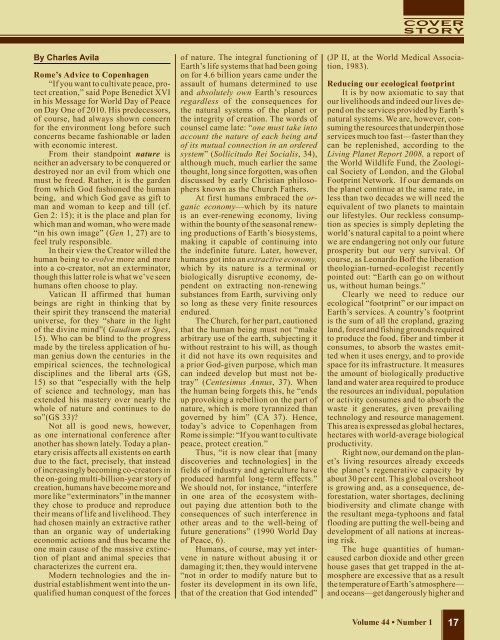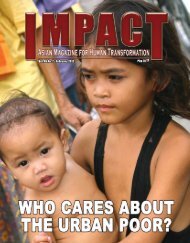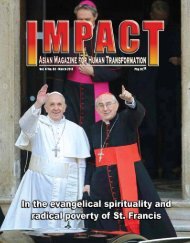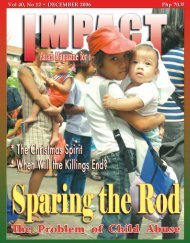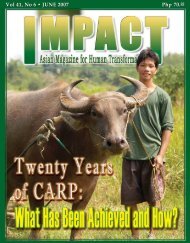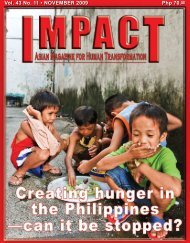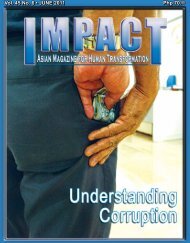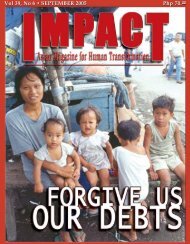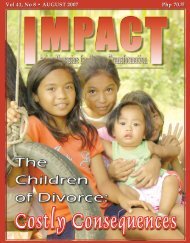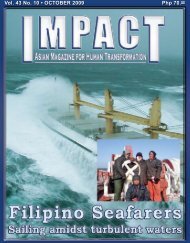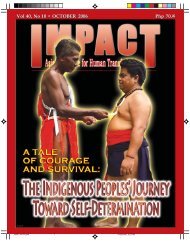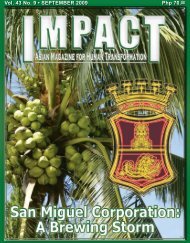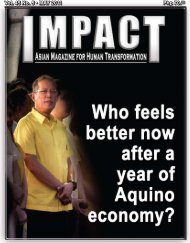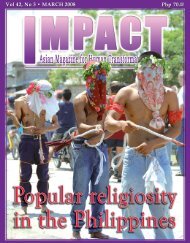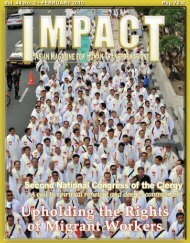Php 70.00 Vol. 44 No. 1 • JANUARY 2010 - IMPACT Magazine Online!
Php 70.00 Vol. 44 No. 1 • JANUARY 2010 - IMPACT Magazine Online!
Php 70.00 Vol. 44 No. 1 • JANUARY 2010 - IMPACT Magazine Online!
Create successful ePaper yourself
Turn your PDF publications into a flip-book with our unique Google optimized e-Paper software.
COVER<br />
STORY<br />
By Charles Avila<br />
Rome’s Advice to Copenhagen<br />
“If you want to cultivate peace, protect<br />
creation,” said Pope Benedict XVI<br />
in his Message for World Day of Peace<br />
on Day One of <strong>2010</strong>. His predecessors,<br />
of course, had always shown concern<br />
for the environment long before such<br />
concerns became fashionable or laden<br />
with economic interest.<br />
From their standpoint nature is<br />
neither an adversary to be conquered or<br />
destroyed nor an evil from which one<br />
must be freed. Rather, it is the garden<br />
from which God fashioned the human<br />
being, and which God gave as gift to<br />
man and woman to keep and till (cf.<br />
Gen 2: 15); it is the place and plan for<br />
which man and woman, who were made<br />
“in his own image” (Gen 1, 27) are to<br />
feel truly responsible.<br />
In their view the Creator willed the<br />
human being to evolve more and more<br />
into a co-creator, not an exterminator,<br />
though this latter role is what we’ve seen<br />
humans often choose to play.<br />
Vatican II affirmed that human<br />
beings are right in thinking that by<br />
their spirit they transcend the material<br />
universe, for they “share in the light<br />
of the divine mind”( Gaudium et Spes,<br />
15). Who can be blind to the progress<br />
made by the tireless application of human<br />
genius down the centuries in the<br />
empirical sciences, the technological<br />
disciplines and the liberal arts (GS,<br />
15) so that “especially with the help<br />
of science and technology, man has<br />
extended his mastery over nearly the<br />
whole of nature and continues to do<br />
so”(GS 33)?<br />
<strong>No</strong>t all is good news, however,<br />
as one international conference after<br />
another has shown lately. Today a planetary<br />
crisis affects all existents on earth<br />
due to the fact, precisely, that instead<br />
of increasingly becoming co-creators in<br />
the on-going multi-billion-year story of<br />
creation, humans have become more and<br />
more like “exterminators” in the manner<br />
they chose to produce and reproduce<br />
their means of life and livelihood. They<br />
had chosen mainly an extractive rather<br />
than an organic way of undertaking<br />
economic actions and thus became the<br />
one main cause of the massive extinction<br />
of plant and animal species that<br />
characterizes the current era.<br />
Modern technologies and the industrial<br />
establishment went into the unqualified<br />
human conquest of the forces<br />
of nature. The integral functioning of<br />
Earth’s life systems that had been going<br />
on for 4.6 billion years came under the<br />
assault of humans determined to use<br />
and absolutely own Earth’s resources<br />
regardless of the consequences for<br />
the natural systems of the planet or<br />
the integrity of creation. The words of<br />
counsel came late: “one must take into<br />
account the nature of each being and<br />
of its mutual connection in an ordered<br />
system” (Sollicitudo Rei Socialis, 34),<br />
although much, much earlier the same<br />
thought, long since forgotten, was often<br />
discussed by early Christian philosophers<br />
known as the Church Fathers.<br />
At first humans embraced the organic<br />
economy—which by its nature<br />
is an ever-renewing economy, living<br />
within the bounty of the seasonal renewing<br />
productions of Earth’s biosystems,<br />
making it capable of continuing into<br />
the indefinite future. Later, however,<br />
humans got into an extractive economy,<br />
which by its nature is a terminal or<br />
biologically disruptive economy, dependent<br />
on extracting non-renewing<br />
substances from Earth, surviving only<br />
so long as these very finite resources<br />
endured.<br />
The Church, for her part, cautioned<br />
that the human being must not “make<br />
arbitrary use of the earth, subjecting it<br />
without restraint to his will, as though<br />
it did not have its own requisites and<br />
a prior God-given purpose, which man<br />
can indeed develop but must not betray”<br />
(Centesimus Annus, 37). When<br />
the human being forgets this, he “ends<br />
up provoking a rebellion on the part of<br />
nature, which is more tyrannized than<br />
governed by him” (CA 37). Hence,<br />
today’s advice to Copenhagen from<br />
Rome is simple: “If you want to cultivate<br />
peace, protect creation.”<br />
Thus, “it is now clear that [many<br />
discoveries and technologies] in the<br />
fields of industry and agriculture have<br />
produced harmful long-term effects.”<br />
We should not, for instance, “interfere<br />
in one area of the ecosystem without<br />
paying due attention both to the<br />
consequences of such interference in<br />
other areas and to the well-being of<br />
future generations” (1990 World Day<br />
of Peace, 6).<br />
Humans, of course, may yet intervene<br />
in nature without abusing it or<br />
damaging it; then, they would intervene<br />
“not in order to modify nature but to<br />
foster its development in its own life,<br />
that of the creation that God intended”<br />
(JP II, at the World Medical Association,<br />
1983).<br />
Reducing our ecological footprint<br />
It is by now axiomatic to say that<br />
our livelihoods and indeed our lives depend<br />
on the services provided by Earth’s<br />
natural systems. We are, however, consuming<br />
the resources that underpin those<br />
services much too fast—faster than they<br />
can be replenished, according to the<br />
Living Planet Report 2008, a report of<br />
the World Wildlife Fund, the Zoological<br />
Society of London, and the Global<br />
Footprint Network. If our demands on<br />
the planet continue at the same rate, in<br />
less than two decades we will need the<br />
equivalent of two planets to maintain<br />
our lifestyles. Our reckless consumption<br />
as species is simply depleting the<br />
world’s natural capital to a point where<br />
we are endangering not only our future<br />
prosperity but our very survival. Of<br />
course, as Leonardo Boff the liberation<br />
theologian-turned-ecologist recently<br />
pointed out: “Earth can go on without<br />
us, without human beings.”<br />
Clearly we need to reduce our<br />
ecological “footprint” or our impact on<br />
Earth’s services. A country’s footprint<br />
is the sum of all the cropland, grazing<br />
land, forest and fishing grounds required<br />
to produce the food, fiber and timber it<br />
consumes, to absorb the wastes emitted<br />
when it uses energy, and to provide<br />
space for its infrastructure. It measures<br />
the amount of biologically productive<br />
land and water area required to produce<br />
the resources an individual, population<br />
or activity consumes and to absorb the<br />
waste it generates, given prevailing<br />
technology and resource management.<br />
This area is expressed as global hectares,<br />
hectares with world-average biological<br />
productivity.<br />
Right now, our demand on the planet’s<br />
living resources already exceeds<br />
the planet’s regenerative capacity by<br />
about 30 per cent. This global overshoot<br />
is growing and, as a consequence, deforestation,<br />
water shortages, declining<br />
biodiversity and climate change with<br />
the resultant mega-typhoons and fatal<br />
flooding are putting the well-being and<br />
development of all nations at increasing<br />
risk.<br />
The huge quantities of humancaused<br />
carbon dioxide and other green<br />
house gases that get trapped in the atmosphere<br />
are excessive that as a result<br />
the temperature of Earth’s atmosphere—<br />
and oceans—get dangerously higher and<br />
<strong>Vol</strong>ume <strong>44</strong> <strong>•</strong> Number 1 17


